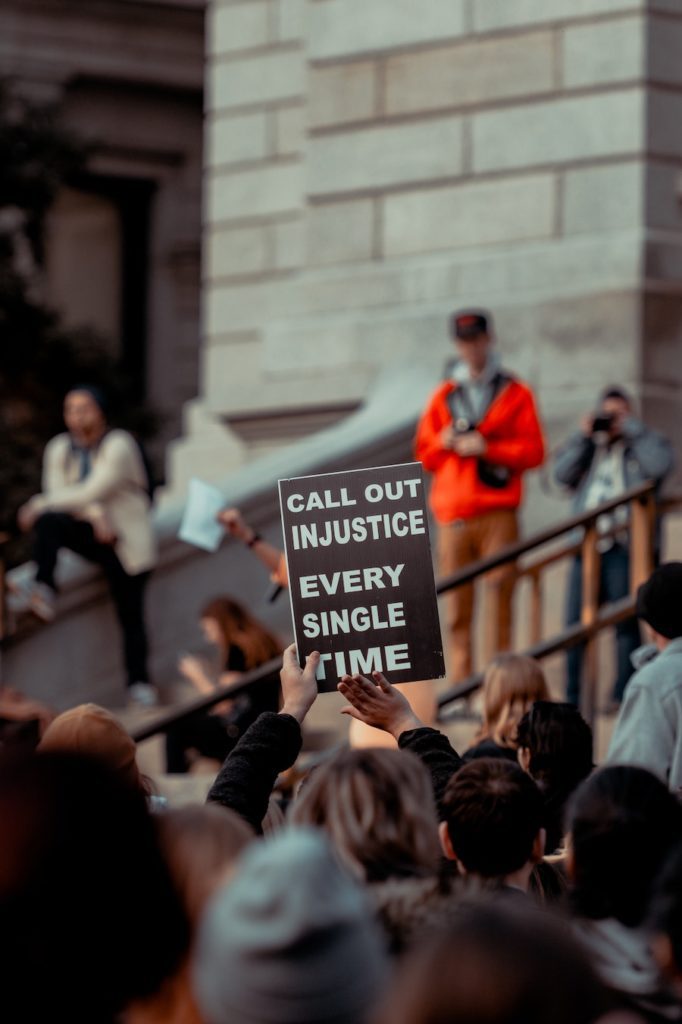By Curt Collier

There is a complex custom within the Ethical Culture movement which states that we don’t take a stand on certain issues regarding personal beliefs. A prime example is that we are neutral on whether an individual should believe in a god, as this is simply a matter of individual choice and because we focus more on actions than beliefs. Making statements is also complicated because we believe ethical insights and ideals continue to arise through human interaction–that relationships are the hallowed context from which new ethical insights emerge. And, as we have no body of scriptures that lays down once and for all how we should live, claiming that we alone know the truth for all individuals in all situations and for all time violates a core ethical praxis.
Questions to ask
However, this does not mean that Ethical Culture is neutral on every idea, and our ethics is not relativistic. Our belief in autonomy is grounded within our belief in the worth and dignity of all, and thus any action that disparages human worth is condemnable. Central, too, is freedom of thought and action, once again, as long as those actions don’t negate the worth of others. And, most importantly, as a religious movement that believes ethics arises out of human interaction, anything that prevents relationship-building is wrong by design. With this ethical praxis in mind, when judging the ethical content of an action I often apply a series of tests. Does it lead to deeper relationships, or does it exclude? Does it elicit the best from others, or lead to defensiveness and estrangement? Are we making our ethical choices freely (which, for many of us, is a necessary condition for any action to be called ethical), or are we compelled from overt or covert outside pressures? Thus, we can easily condemn white supremacy, exploitation, misogyny, racism, terrorism, slavery, violence, manipulation, and less explicit actions such as denying individuals the right to education, the freedom of conscience, lack of access to a decent place to live, the right to work that is fulfilling, and so on.
Ruling diminishes rights
It is for these reasons that many of us are outraged that a woman’s right to control her own body has been denied by the highest court in the US. While Justice Samuel Alito and his conservative cronies have attempted to argue that this is nothing more than a reaffirmation of the State’s right to make decisions on issues where they claim our US constitution is neutral (claiming that our constitution does not guarantee the right to an abortion), many rightly feel that this is nothing more than a pretense for pushing their own personal (and antiquated) religious beliefs. The upshot is that a small group of individuals have diminished the rights of millions of Americans.
Your ethics colors your view
Ethical beliefs matter. While Ethical Culture also has a tradition of avoiding proselytizing, a side effect of strongly believing in the autonomy of belief, I feel that this is a misreading of our ethics. Your ethical beliefs impact how you view the world and the decisions you make. Every day our news is filled with the heinous actions of some who claim their moral authority supersedes the worth and dignity of others. Rampant gun violence, the rise in hate crimes, the vile trafficking of “sex slaves,” war, separation of children from their parents at our borders, book burnings and assaults on academic freedom, and so on are unequivocally wrong. It is ethically essential to take a stand.
Some critics would say that this statement is untenable and inconsistent with our belief in an emergent ethical system and our disavowal of ethical absolutes. I believe they are wrong on two accounts. Ethics for me is emergent and I don’t believe in ethical absolutes, but as argued, an emergent ethical system such as ours is contingent on affirming the worth and dignity of others as the process from which ethical insights emerge. There is no inconsistency, then, in stating both that ethics emerges out of the reciprocal action of autonomous actors and claiming that the recent Supreme Court decision is morally reprehensible as it violates that process. Second, the alternative to remaining “neutral” is ethically inconsistent, as you cannot say “I don’t know how humans should live, and thus the best way for them to live is to be neutral (i.e., “tolerant,” “accepting,” or some misguided version of “live and let live,” etc.). In that statement, you claim you don’t know how we should live and then proceed to say how we should live.
Let’s not accept this
What this means is that ethics is about choice. The Supreme Court justices made a choice that is ethically inconsistent and morally invalid. Those of us who believe that ethics must begin with choice and that affirming the worth and dignity of individuals should be paramount in a just system, are equally responsible for speaking out and working to overcome this injustice. Let us not accept this quietly. As Justice Clarence Thomas wrote, this is only the first step toward a further reduction in human rights. Our nation is moving backwards. As human rights activist and holocaust survivor Elie Wiesel wrote, “There may be times when we are powerless to prevent injustice, but there must never be a time when we fail to protest.” This is such a time.
Curt Collier is leader of the Ethical Culture Society of Bergen County.



